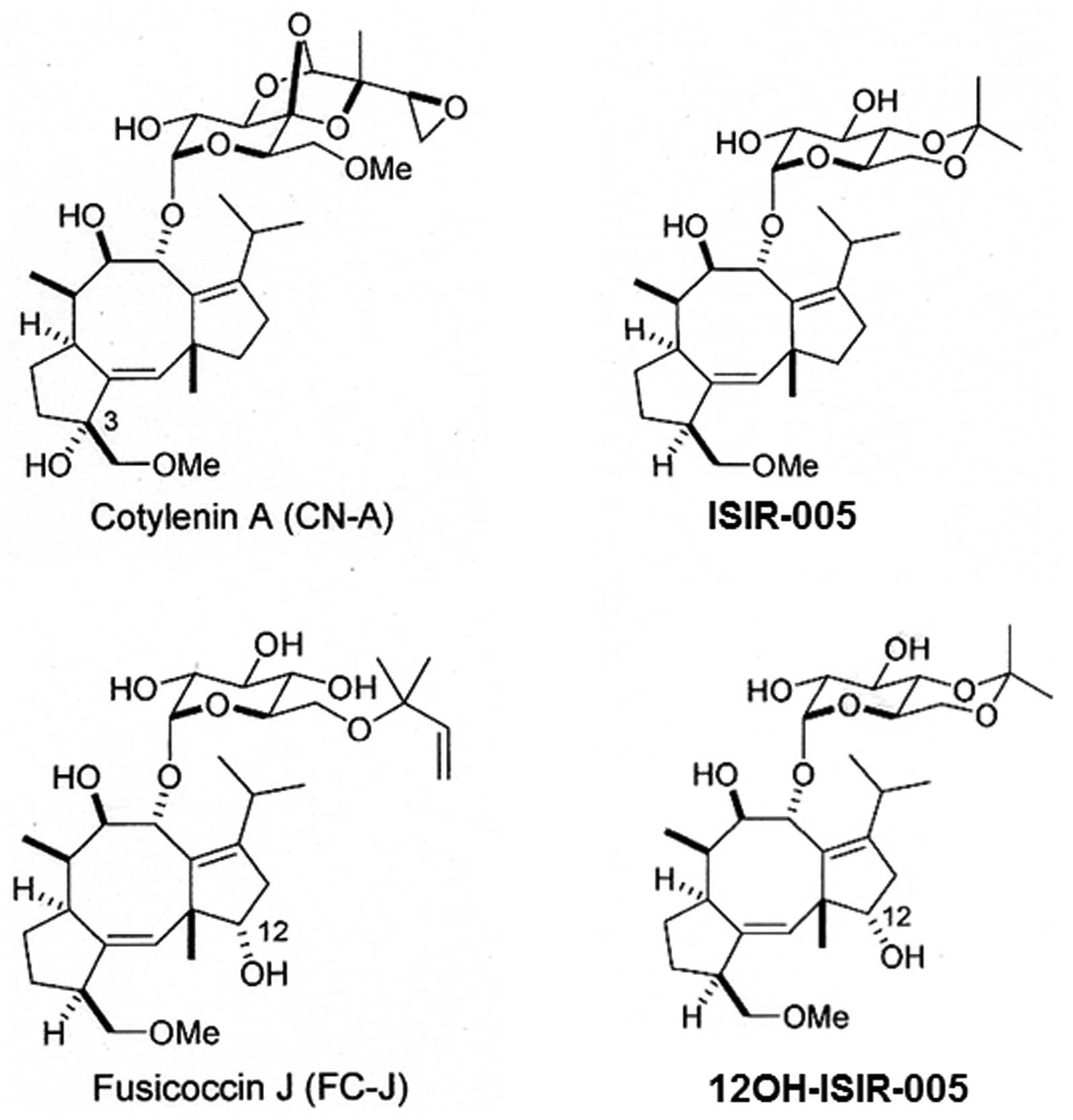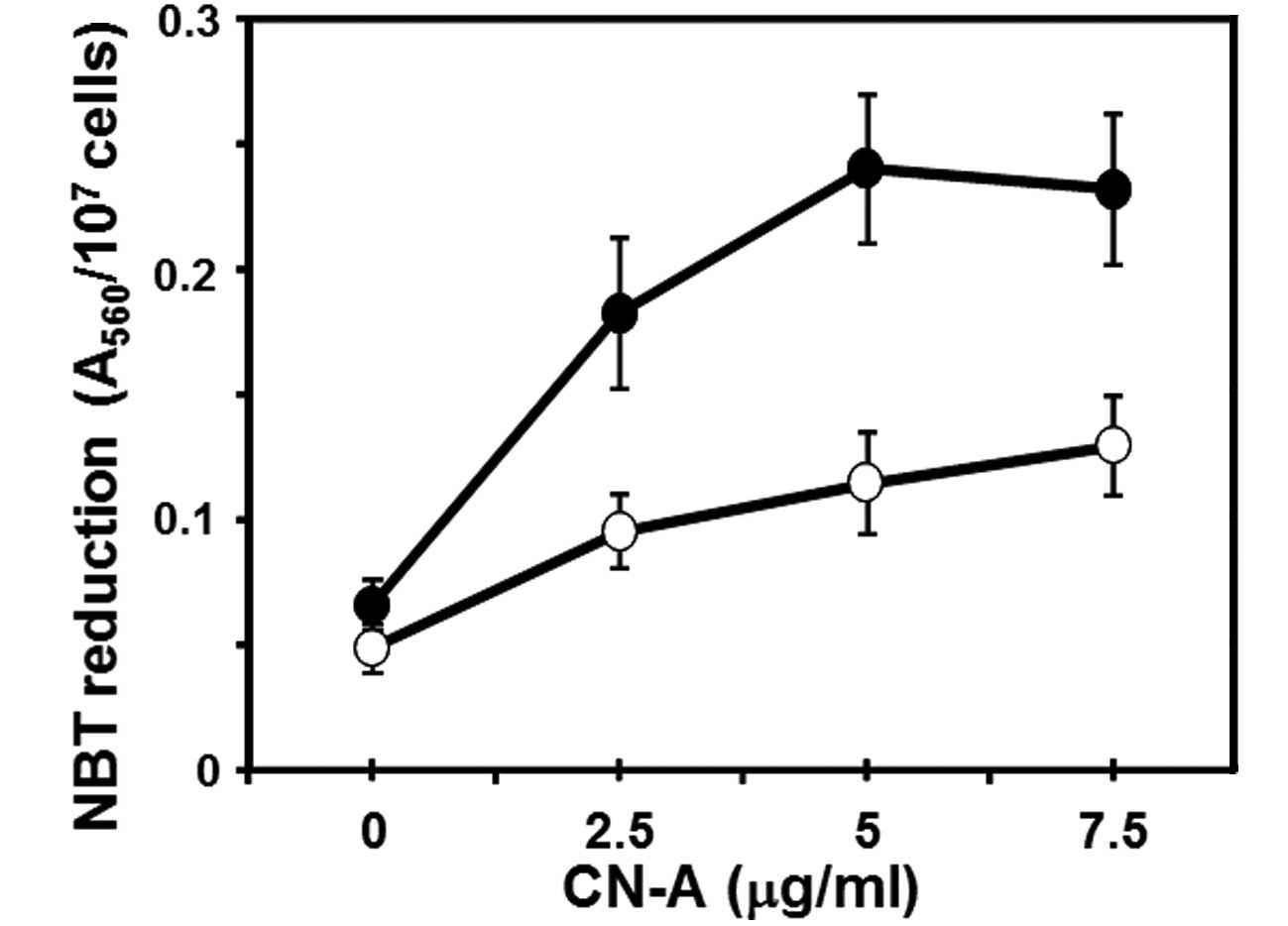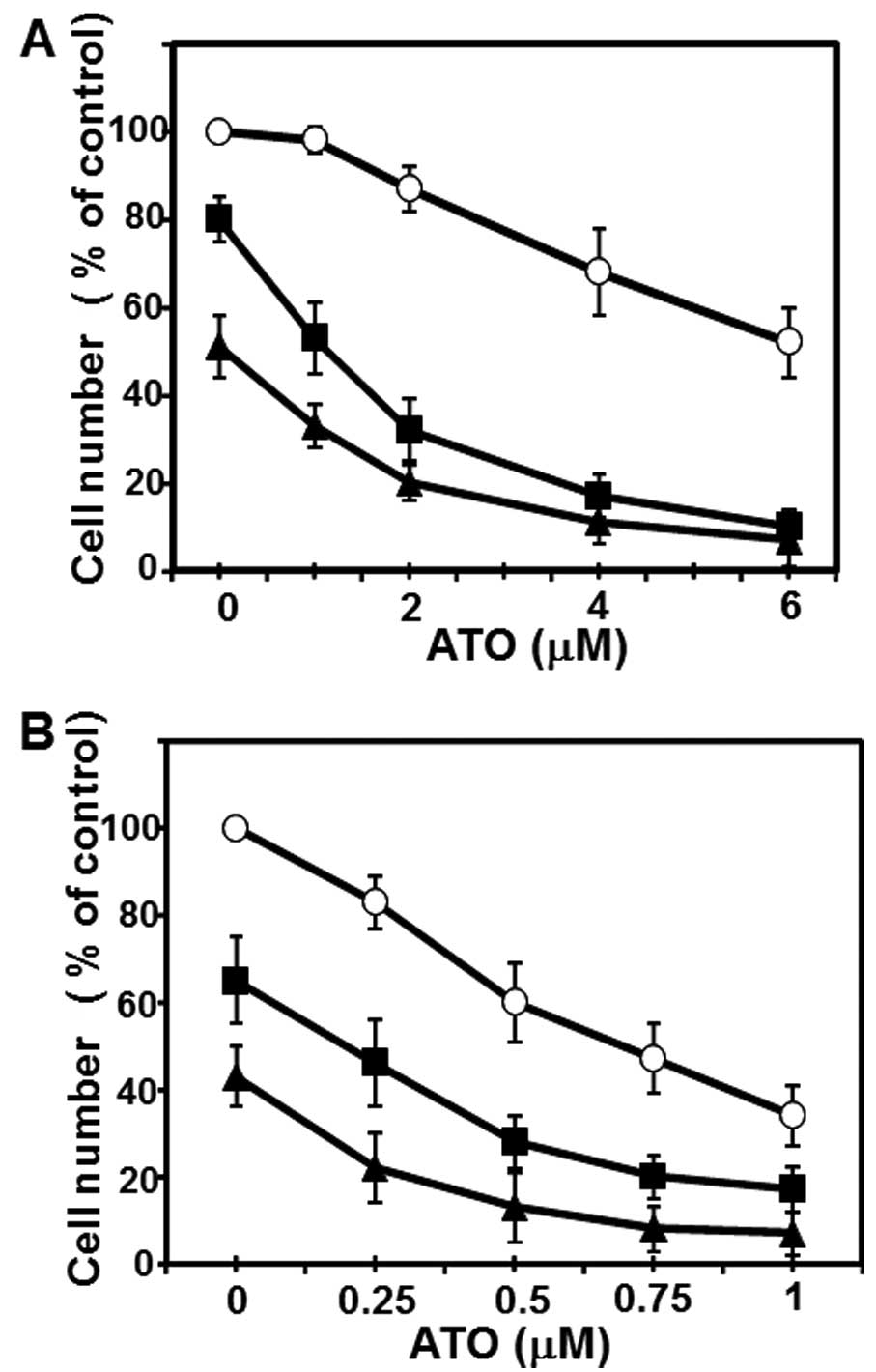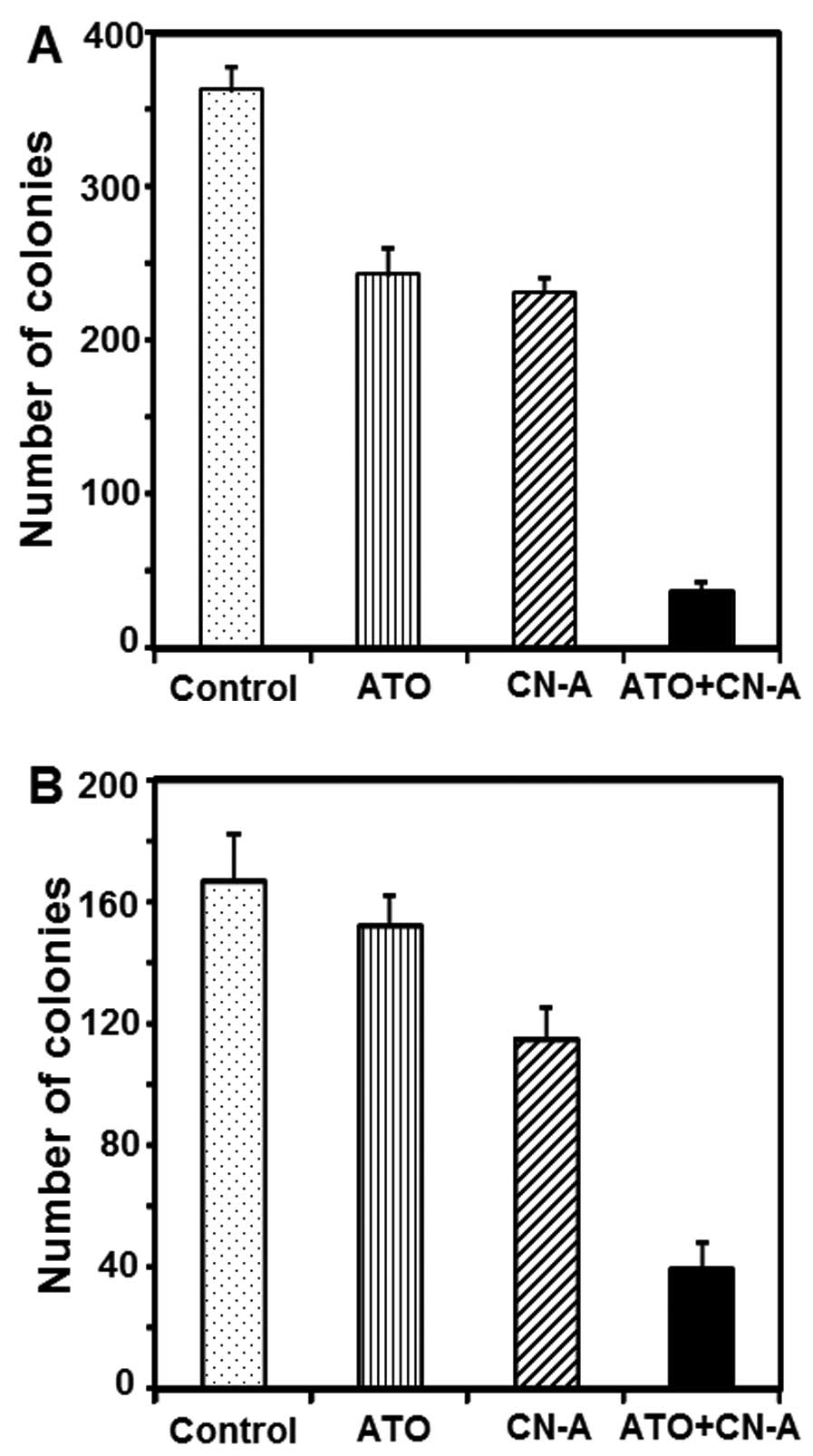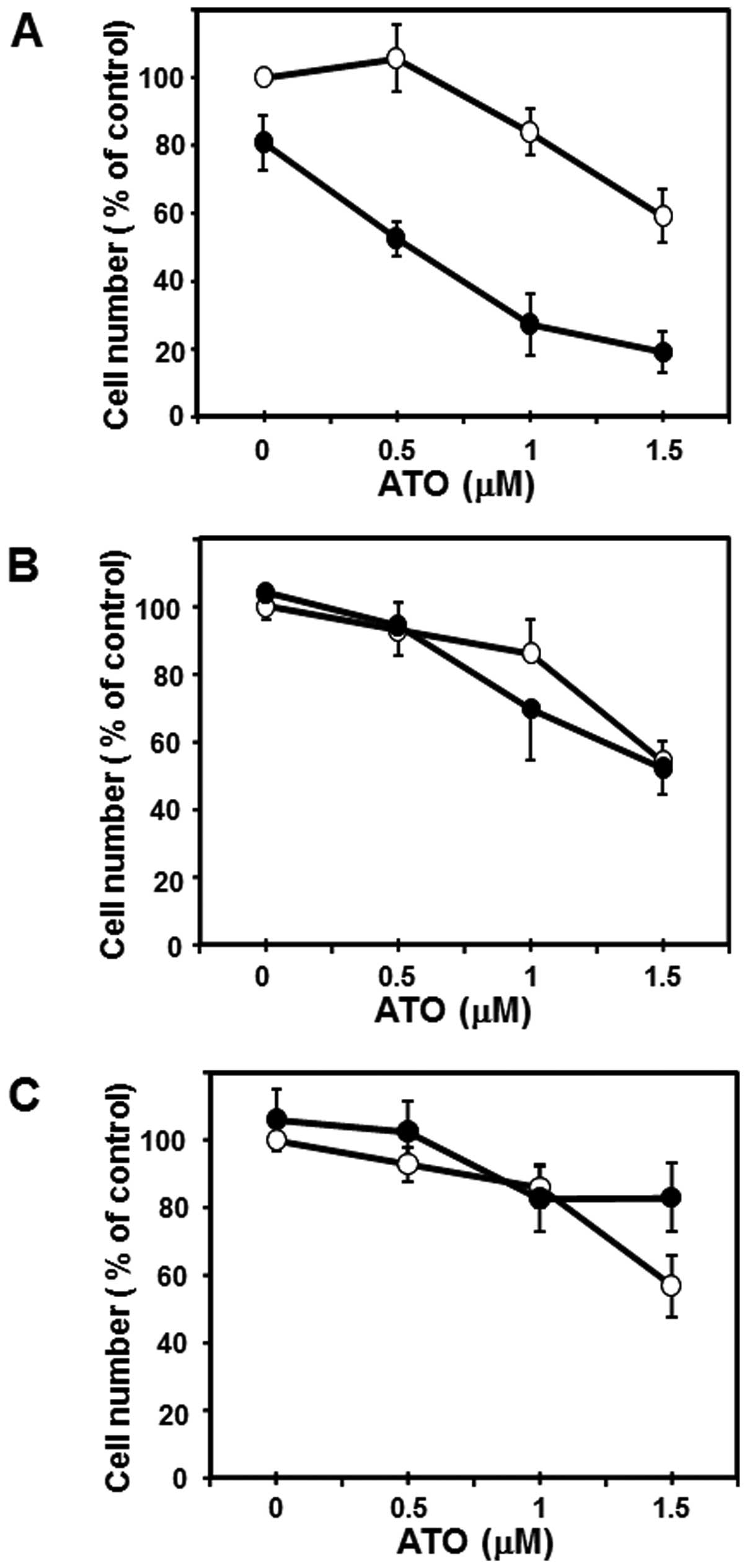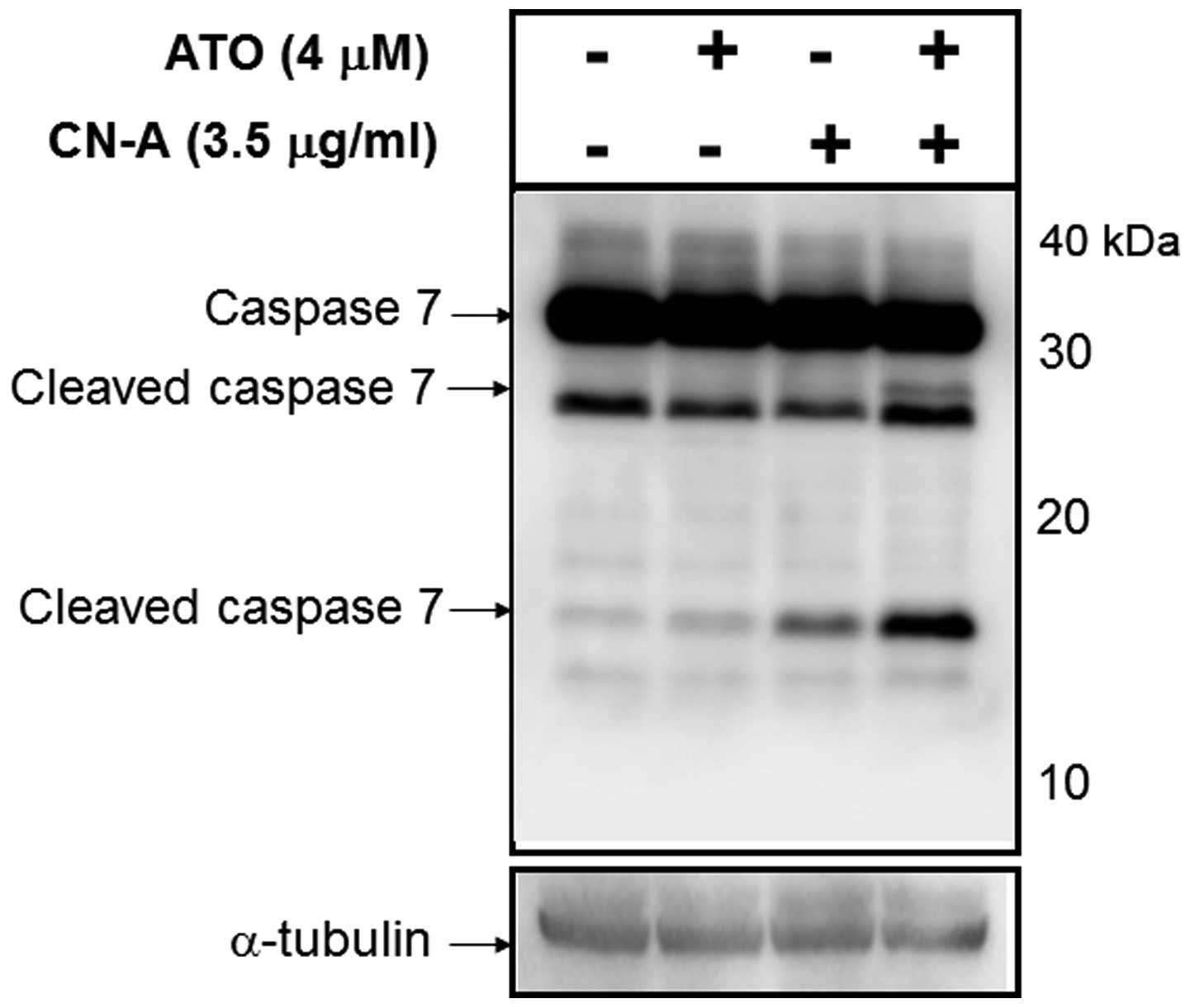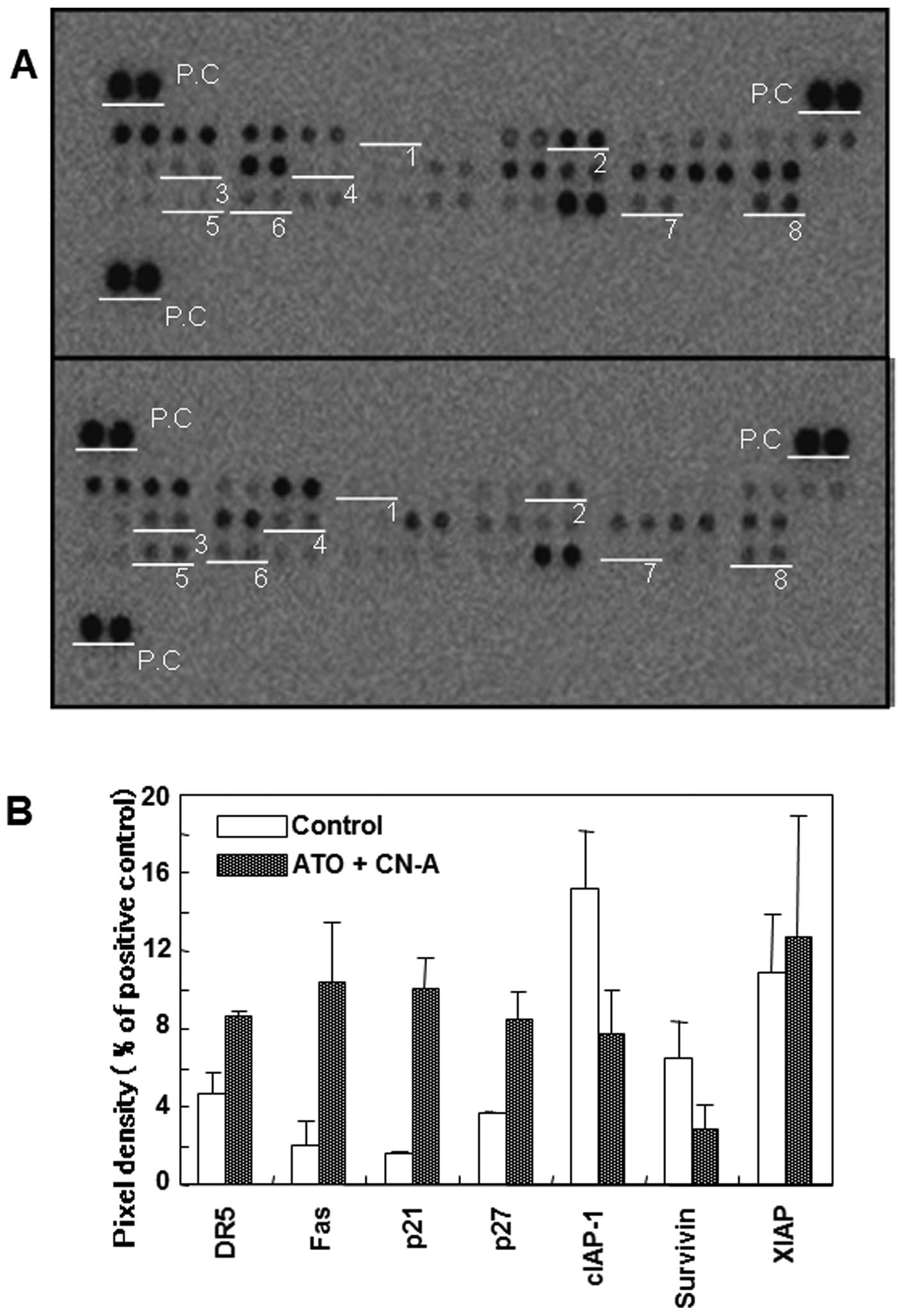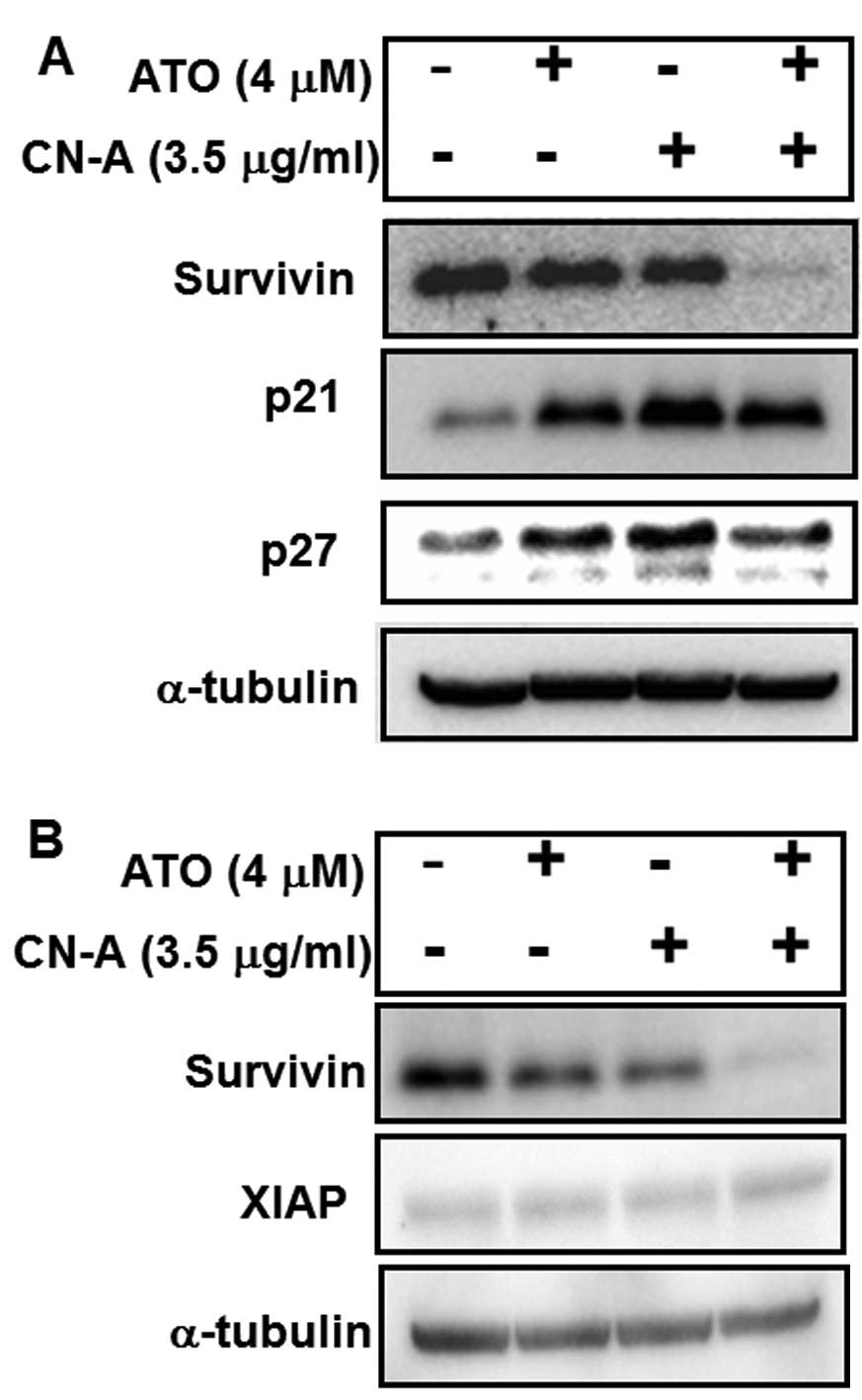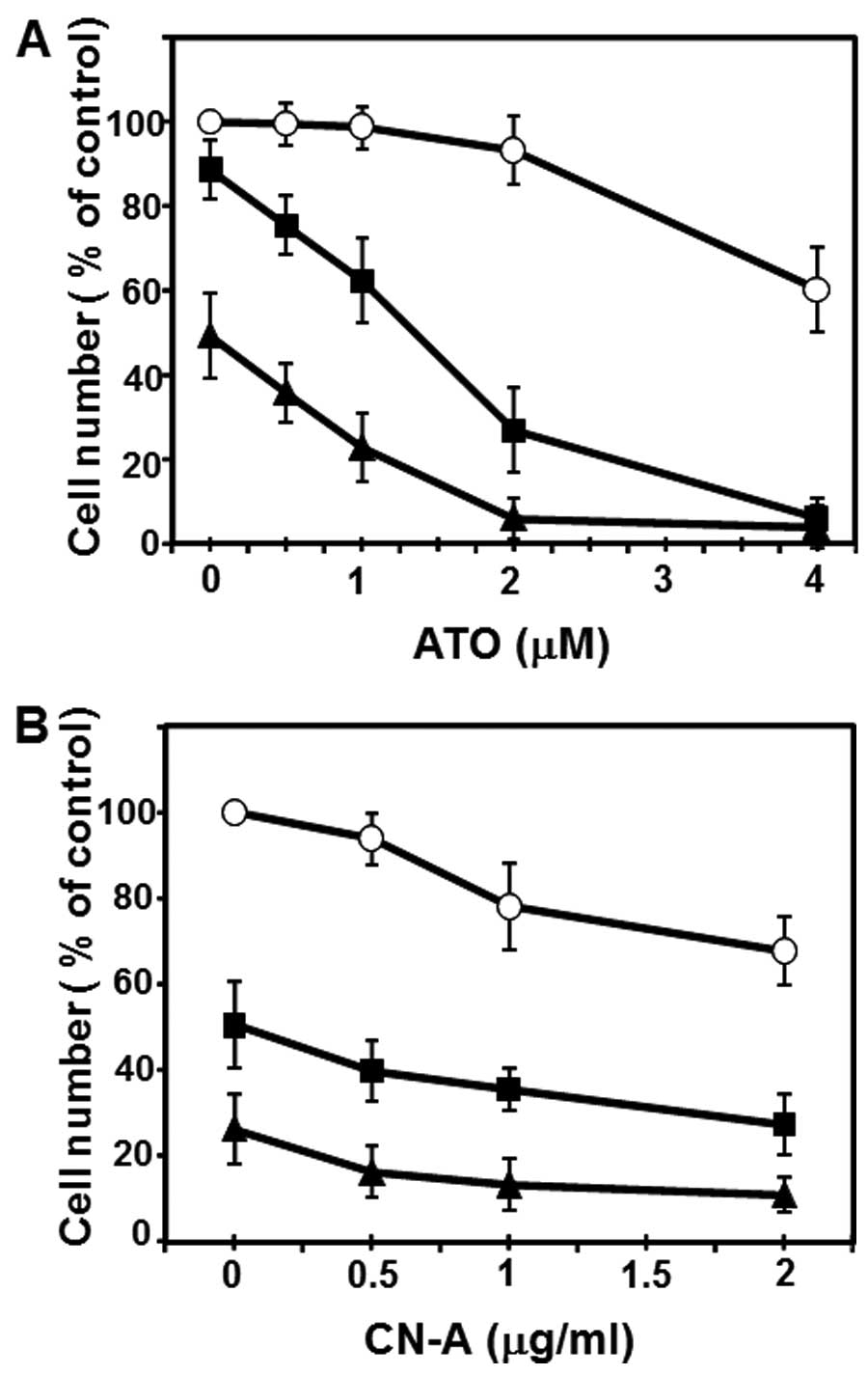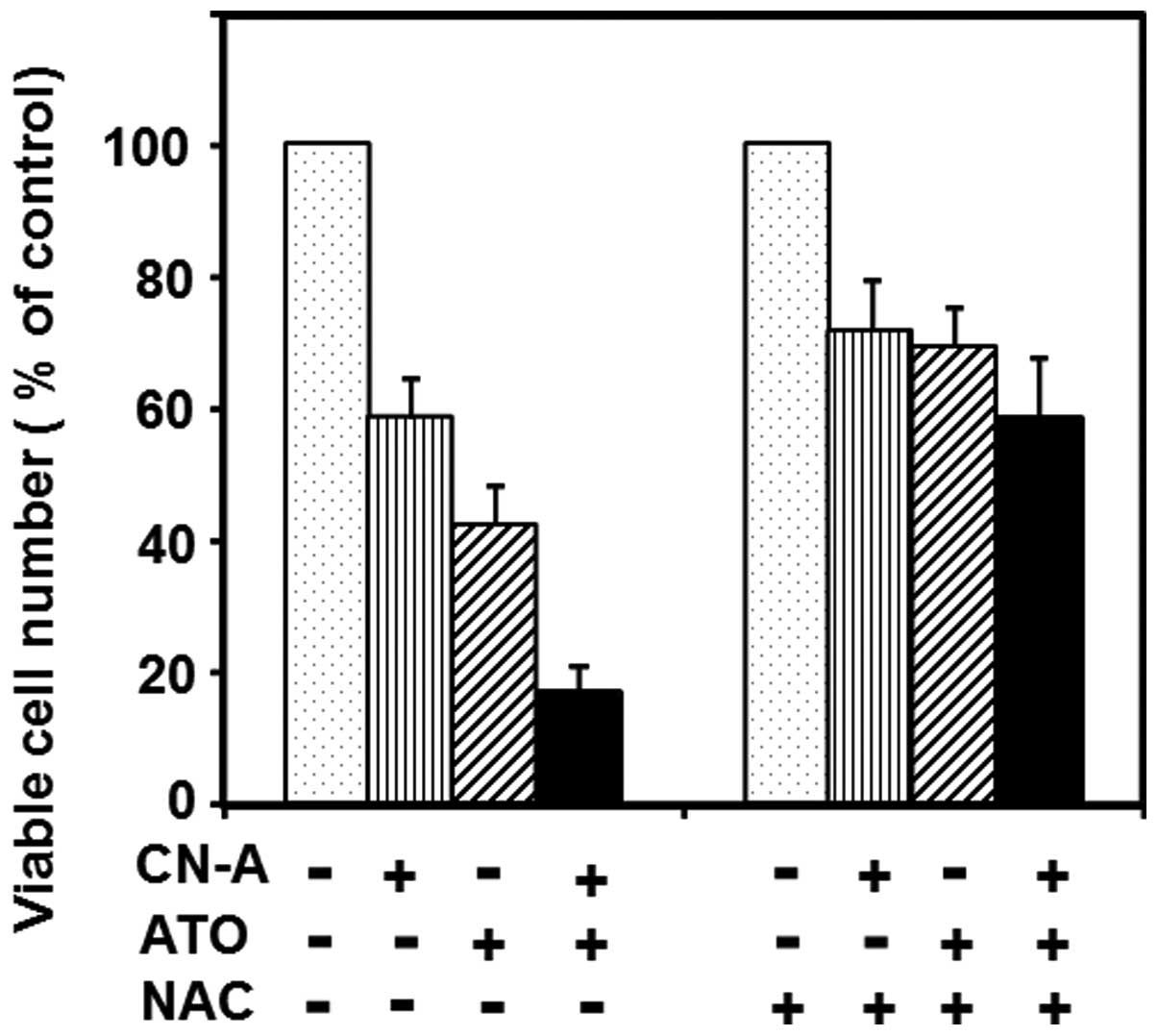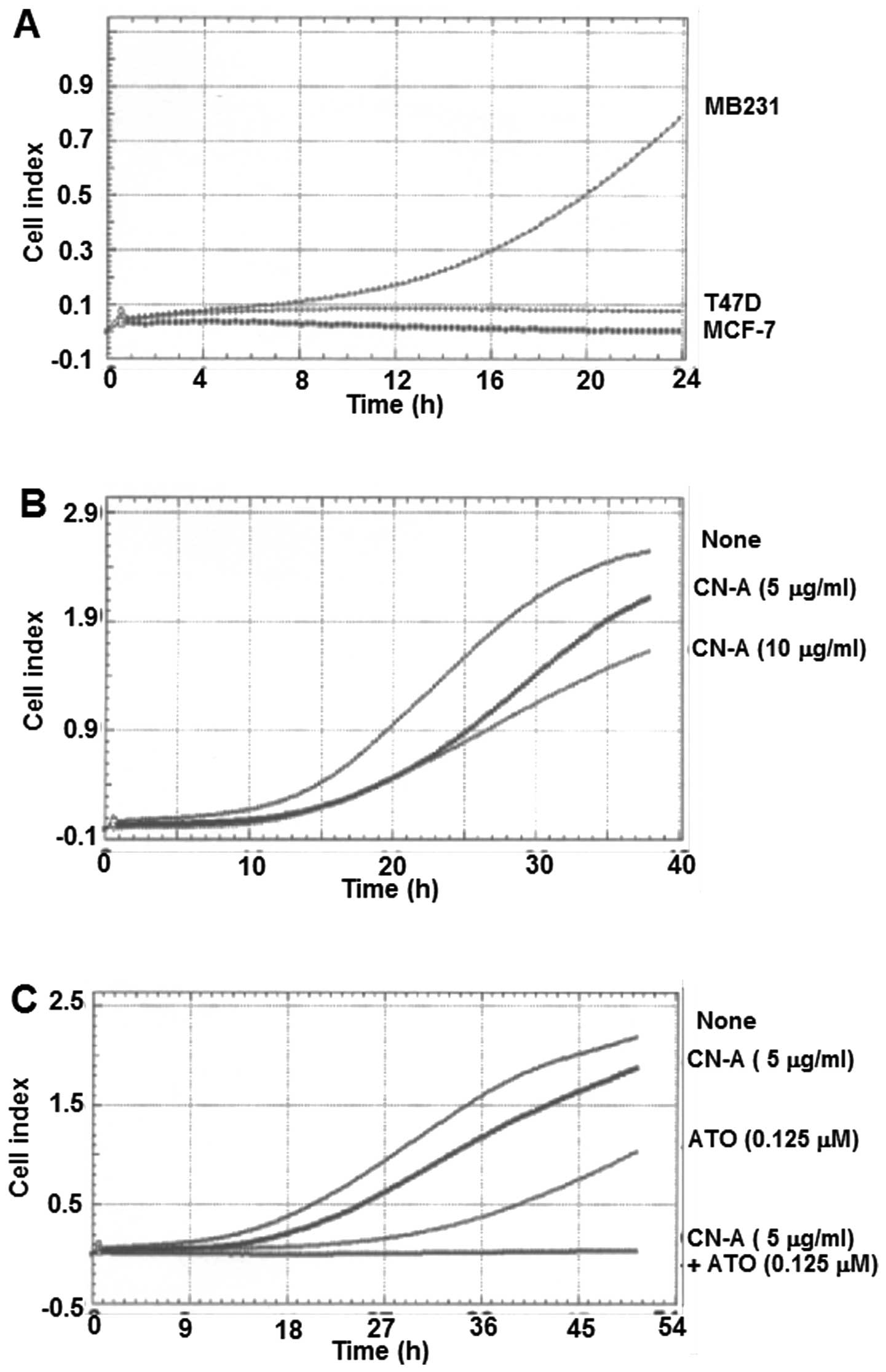|
1
|
Siegel R, Naishadham D and Jemal A: Cancer
statistics, 2013. CA Cancer J Clin. 63:11–30. 2013. View Article : Google Scholar : PubMed/NCBI
|
|
2
|
Siegel R, Naishadham MA and Jemal A:
Cancer statistics, 2012. CA Cancer J Clin. 62:10–29. 2012.
View Article : Google Scholar : PubMed/NCBI
|
|
3
|
Hurvitz S, Hu Y, O’Brien N and Finn RS:
Current approaches and future directions in the treatment of
HER2-positive breast cancer. Cancer Treat Rev. 39:219–229. 2013.
View Article : Google Scholar
|
|
4
|
Gianni M, Koken MH, Chelbi-Alix MK, Benoit
G, et al: Combined arsenic and retinoic acid treatment enhances
differentiation and apoptosis in arsenic-resistant NB4 cells.
Blood. 91:4300–4310. 1998.PubMed/NCBI
|
|
5
|
Shen ZX, Chen GQ, Ni XS, et al: Use of
arsenic trioxide (As2O3) in the treatment of
acute promyelocytic leukemia (APL): II. Clinical efficacy and
pharmacokinetics in relapsed patients. Blood. 89:3354–3360.
1997.PubMed/NCBI
|
|
6
|
Deuer D and Tallman MS: Arsenic trioxide:
new clinical experience with an old medication in hematologic
malignancies. J Clin Oncol. 23:2396–2410. 2005. View Article : Google Scholar
|
|
7
|
Platanias L: Biological responses to
arsenic compounds. J Biol Chem. 284:18583–18587. 2009. View Article : Google Scholar : PubMed/NCBI
|
|
8
|
Emadi A and Gore SD: Arsenic trioxide-An
old drug rediscovered. Blood Rev. 24:191–199. 2010. View Article : Google Scholar : PubMed/NCBI
|
|
9
|
Takahashi S: Combination therapy with
arsenic trioxide for hematological malignancies. Anticancer Agents
Med Chem. 10:504–510. 2010. View Article : Google Scholar : PubMed/NCBI
|
|
10
|
Zhang X, Su Y and Sun Z: Opposite effects
of arsenic trioxide on the Nrf2 pathway in oral squamous cell
carcinoma in vitro and in vivo. Cancer Lett. 18:93–98. 2012.
View Article : Google Scholar
|
|
11
|
Kryeziu K, Jungwirth U, Hoda MA, et al:
Synergistic anticancer activity of arsenic trioxide with erlotinib
is based on inhibition of EGFR-mediated DNA double-strand break
repair. Mol Cancer Ther. 12:1073–1084. 2013. View Article : Google Scholar : PubMed/NCBI
|
|
12
|
Liu W, Gong Y, Li H, et al:
Arsenic-induced growth arrest of breast cancer MCF-7 cells
involving FOXO3a and IkB kinase β expression and localization.
Cancer Biother Radiopharm. 27:504–512. 2012. View Article : Google Scholar : PubMed/NCBI
|
|
13
|
Kasukabe T, Okabe-Kado J, Haranosono Y,
Kato N and Honma Y: Inhibition of rapamycin-induced Akt
phosphorylation by cotylenin A correlated with their synergistic
growth inhibition of cancer cells. Int J Oncol. 42:767–775.
2013.
|
|
14
|
Vuky J, Yu R, Schwartz L and Motzer RJ:
Phase II trial of arsenic trioxide in patients with metastatic
renal cell carcinoma. Invest New Drugs. 20:327–330. 2002.
View Article : Google Scholar : PubMed/NCBI
|
|
15
|
Kim KB, Bedikian AY, Camacho LH,
Papadopoulos NE and McCullough C: A phase II trial of arsenic
trioxide in patients with metastatic melanoma. Cancer.
104:1687–1692. 2005. View Article : Google Scholar : PubMed/NCBI
|
|
16
|
Lin CC, Hsu C, Hsu CH, Hsu WL, Cheng AL
and Yang CH: Arsenic trioxide in patients with hepatocellular
carcinoma: a phase II trial. Invest New Drugs. 25:77–84. 2006.
View Article : Google Scholar : PubMed/NCBI
|
|
17
|
Abe O, Abe R, Enomoto K, et al: Effects of
chemotherapy and hormonal therapy for early breast cancer on
recurrence and 15-year survival: an overview of the randomized
trials. Lancet. 365:1687–1717. 2005. View Article : Google Scholar
|
|
18
|
Zhao XY, Yang S, Chen YR, Li PC, Dou MM
and Zhang J: Resveratrol and arsenic trioxide act synergistically
to kill tumor cells in vitro and in vivo. PloS One. 9:e989252014.
View Article : Google Scholar : PubMed/NCBI
|
|
19
|
Sassa T, Tojyo T and Munakata K: Isolation
of a new plant growth substance with cytokinin-like activity.
Nature. 227:3791970. View
Article : Google Scholar : PubMed/NCBI
|
|
20
|
Asahi K, Honma Y and Hazeki K: Cotylenin
A, a plant-growth regulator, induces the differentiation in murine
and human myeloid leukemia cells. Biochem Biophys Res Commun.
238:758–763. 1997. View Article : Google Scholar : PubMed/NCBI
|
|
21
|
Yamamoto-Yamaguchi Y, Yamada K, Ishii Y,
Asahi KI, Tomoyasu S and Honma Y: Induction of the monocytic
differentiation of myeloid leukemia cells by cotylenin A, a plant
growth regulator. Br J Haematol. 112:697–705. 2001. View Article : Google Scholar : PubMed/NCBI
|
|
22
|
Yamada K, Honma Y, Asahi KI, Sassa T, Hino
KI and Tomoyasu S: Differentiation of human acute myeloid leukemia
cells in primary culture in response to cotylenin A, a plant growth
regulator. Br J Haematol. 114:814–821. 2001. View Article : Google Scholar : PubMed/NCBI
|
|
23
|
Honma Y: Cotylenin A: a plant growth
regulator as a differentiation-inducing agent against myeloid
leukemia. Leuk Lymphoma. 43:1169–1178. 2002. View Article : Google Scholar : PubMed/NCBI
|
|
24
|
Yamamoto-Yamaguchi Y, Okabe-Kado J,
Kasukabe T and Honma Y: Induction of differentiation of human
myeloid leukemia cells by immunosuppressant macrolides (rapamycin
and FK506) and calcium/calmodulin-dependent kinase inhibitors. Exp
Hematol. 29:582–588. 2001. View Article : Google Scholar : PubMed/NCBI
|
|
25
|
Kasukabe T, Okabe-Kado J, Kato N, Sassa T
and Honma Y: Effects of combined treatment with rapamycin and
cotylenin A, a novel differentiation-inducing agent, on human
breast carcinoma MCF-7 cells and xenografts. Breast Cancer Res.
7:R1097–R1110. 2005. View
Article : Google Scholar
|
|
26
|
Kasukabe T, Okabe-Kado J and Honma Y:
Cotylenin A, a new differentiation inducer, and rapamycin
cooperatively inhibit growth of cancer cells through induction of
cyclin G2. Cancer Sci. 99:1693–1698. 2008. View Article : Google Scholar : PubMed/NCBI
|
|
27
|
Kawakami K, Hattori M, Inoue T, et al: A
novel Fusicoccin derivative preferentially targets hypoxic tumor
cells and inhibits tumor growth in xenografts. Anticancer Agents
Med Chem. 12:791–800. 2012. View Article : Google Scholar : PubMed/NCBI
|
|
28
|
Nakamaki T, Okabe-Kado J,
Yamamoto-Yamaguchi Y, et al: Role of MmTRA1b/phospholipid
scramblase 1 gene expression in the induction of differentiation of
human myeloid leukemia cells into granulocytes. Exp Hematol.
30:421–429. 2002. View Article : Google Scholar : PubMed/NCBI
|
|
29
|
Hagiwara Y, Kasukabe T, Kaneko Y, Niitsu N
and Okabe-Kado J: Ellagic acid a natural compound, induces
apoptosis and potentiates retinoic acid-induced differentiation of
human leukemia HL-60 cells. Int J Hematol. 92:136–143. 2010.
View Article : Google Scholar : PubMed/NCBI
|
|
30
|
Zhou C, Boggess J, Bae-Jump V and Gehrig
PA: Induction of apoptosis and inhibition of telomerase activity by
arsenic trioxide (As2O3) in endometrial
carcinoma cells. Gynecol Oncol. 105:218–222. 2007. View Article : Google Scholar : PubMed/NCBI
|
|
31
|
Kumar P, Gao Q, Ning Y, Wang Z, Krebsbach
PH and Polverini PJ: Mol Cancer Ther. 7:2060–2069. 2008. View Article : Google Scholar : PubMed/NCBI
|
|
32
|
Feng Y, Pan TC, Pant DK, et al: SPSB1
promotes breast cancer recurrence by potentiating c-MET signaling.
Cancer Discov. 4:790–803. 2014. View Article : Google Scholar : PubMed/NCBI
|
|
33
|
Janicke RU, Sprenger ML, Wati MR and
Porter AG: Caspase-3 is required for DNA fragmentation and
morphological changes associated with apoptosis. J Biol Chem.
273:9357–9360. 1998. View Article : Google Scholar : PubMed/NCBI
|
|
34
|
Aziz MY, Omar AR, Subramani T, et al:
Damnacanthal is a potent inducer of apoptosis with anticancer
activity by stimulating p53 and p21 genes in MCF-7 breast cancer
cells. Oncol Lett. 7:1479–1484. 2014.PubMed/NCBI
|
|
35
|
Shin S, Sung BJ, Cho YS, et al: An
anti-apoptotic protein human survivin is a direct inhibitor of
caspase-3 and -7. Biochemistry. 40:1117–1123. 2001. View Article : Google Scholar : PubMed/NCBI
|
|
36
|
Nakahara T, Takeuchi M, Kinoyama I, et al:
YM155, a novel small-molecule survivin suppressant, induces
regression of established human hormone-refractory prostate tumor
xenografts. Cancer Res. 67:8014–8021. 2007. View Article : Google Scholar : PubMed/NCBI
|
|
37
|
Li W, Wang M, Wang L, Ji S, Zhang J and
Zhang C: Icariin synergizes with arsenic trioxide to suppress human
hepatocellular carcinoma. Cell Biochem Biophys. 68:427–436. 2014.
View Article : Google Scholar
|
|
38
|
Nakaoka T, Ota A, Ono T, et al: Combined
arsenic trioxidecisplatin treatment enhances apoptosis in oral
squamous cell carcinoma cells. Cell Oncol. 37:119–129. 2014.
View Article : Google Scholar
|
|
39
|
Limame R, Wouters A, Pauwels B, et al:
Comparative analysis of dynamic cell viability, migration and
invasion assessments by novel real-time technology and classic
endpoint assays. PloS One. 7:e465362012. View Article : Google Scholar : PubMed/NCBI
|
|
40
|
Si L, Jiang F, Li Y, et al: Induction of
the mesenchymal to epithelial transition by demethylation-activated
microRNA-200c is involved in the anti-migration/invasion effects of
arsenic trioxide on human breast cancer cells. Mol Carcinog. Apr
14–2014. View Article : Google Scholar : (Epub ahead of
print).
|















